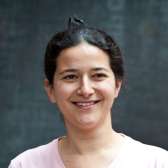
"Shoah and Its Aftermath in Slovenia: Towards a Holistic Interpretation of Central European Anti-Semitism."
Professional Background
Hannah Starman is Visiting Research Fellow at Goldsmiths College at the University of London (United Kingdom). She received her PhD and MA in international politics from the University of Wales Aberystwyth. For her Diane and Howard Wohl Fellowship, Dr. Starman conducted research for her project “Shoah and Its Aftermath in Slovenia: Towards a Holistic Interpretation of Central European Anti-Semitism.”
Dr. Starman is the author of the forthcoming book Testifying to Trauma: The Codification of Atrocity in Humanitarian Law and other publications, including “Generations of the Holocaust: Model for Intergenerational Transmission of Trauma” in Terrain, Revue d’Ethnologie d’Europe No. 53 (2010); “Slovenia” in Handbuch des Antisemitismus: Judenfeinschaft in Geschichte und Gegenwart (in German, 2008); “Mutilation of the Sexual Self: Sexual Abuse in the Catholic Church” in Dnevnik Vol. 58 (in Slovenian, 2008); and “Esoteric Anti-Semitism” in Večer Vol. 60 (in Slovenian, 2005).
She is the recipient of many grants, awards, and fellowships, including a research grant from the World Jewish Restitution Organization (2006–2009), the International Collaborative Research Grant from the Wenner-Gren Foundation (2005–2007), a conference organization grant from the Rothschild Foundation Europe (2006), and a three-year postdoctoral fellowship from the Ministry of Science of the Republic of Slovenia (2004–2006). A native speaker of Slovenian, she is fluent in English and French, with additional skills in Spanish, German, Serbo-Croatian, Italian, and Hebrew.
Fellowship Research
During her time at the Center, Dr. Starman researched the Shoah in Slovenia and the cultural context that factors into its aftermath. She sought to contextualize the testimonies on the specific traumatization survivors suffered after World War II in Slovenian circumstances, and how this traumatization was transmitted in culturally specific ways to their offspring. Her central hypothesis was that a society living in a class-like solidarity translated into categorical ethnic differences, and socialization dysfunctions were generalized from basically dysfunctional family environments onward. This unfolded psychologically and sociologically into a broader context of historical episodes of extreme mass violence, suspension of social functionality by means of authoritarian political power, insurmountable inner political and ideological divisions and, in the circumstances of the post-communism condition, the persistent inability of uncompromising denazification. Dr. Starman used the Museum’s extensive archival collections, including records from the International Tracing Service, to complete her research.
Dr. Starman was in residence at the Mandel Center from April 1 to December 30, 2011.
